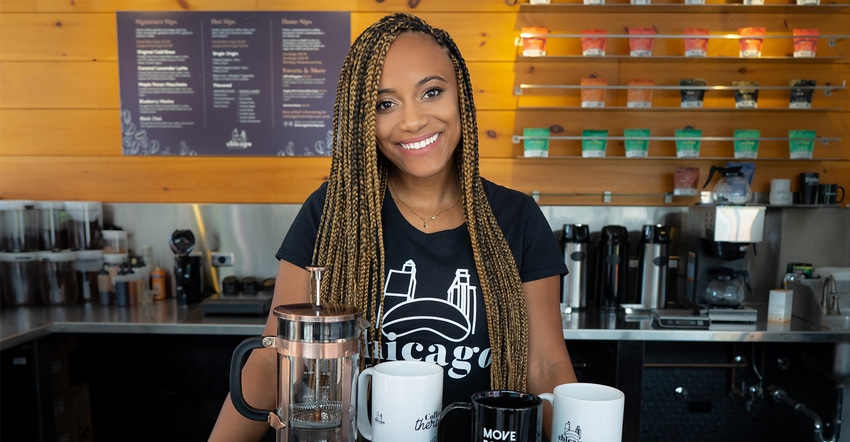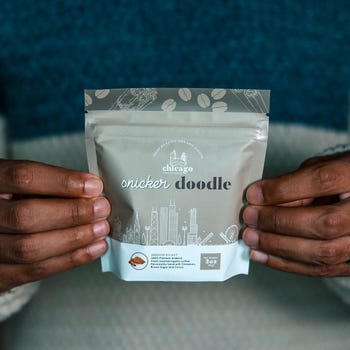Kris Christian has grown Chicago French Press from a local favorite into a national brand that sells at T.J. Maxx, Marshalls and will soon sell on QVC.
February 17, 2021

When Chicago French Press CEO and founder Kris Christian shifted away from investment banking to become a serial entrepreneur, she knew she’d have to bootstrap her way up.
After years of hard work, Christian’s efforts are paying big dividends with a Feb. 16 launch on QVC, the television network that specializes in home shopping.
“I’m excited,” says Christian, a former financial analyst who now runs a mission-driven, fair trade organic coffee company. “Our growth has been a slow but sure process, but my whole point is to make us accessible to everyone nationwide. We’re still a small business and we needed to not bite off too much other than what we can chew.”
Christian, who graduated from Howard University, grew up drinking instant coffee a.k.a. “coffee milk” with her parents. When Christian entered Wall Street, she found herself pouring in extra flavors to mask the bitterness and staleness of office coffee. That prompted an idea: infuse flavors like blueberries and pecans into coffee beans to achieve a sweeter taste, without adding sugar and cream.
“I had an epiphany, what if there was an alternative way to drink coffee in which you could drink real flavors, not serums,” Christian says. “I was tired of the vanilla creamers, the hazelnuts and I wanted something unique.”
Christian channeled her frustration into creating a brand that is now garnering national attention with distribution in approximately 1,600 T.J. Maxx and Marshalls stores in the U.S. and Canada. Christian says it was her unique coffee blends like Chocolate Blueberry, Maple Pecan and Snickerdoodle and sleek Chicago-centric packaging that helped capture the attention of retailers and eventually led to a deal with QVC.
Christian’s journey into coffee didn’t come quickly.
In 2011, Christian quit Wall Street and started an integrated marketing agency, FAME Enterprises, that focused on e-commerce and digital advertising. After working with large and small brands, including Mielle Organics, which grew into a multimillion dollar company, Christian realized she could become a serial entrepreneur and launch a coffee brand.
“Coffee has always been a passion of mine,” says 34-year-old Christian, who is originally from Memphis and moved to Chicago a decade ago. “I knew the next business I started was less about being successful and more about having an impact on my community. I wanted it to be something I was passionate about but it also needed to have a component of nonprofit and charitable work.”
In 2016, Christian launched Chicago French Press, a coffee company that gives 5% of its proceeds to local charities. Her company has 10 employees plus contractors and recently transitioned from a 900-square-foot studio into 3,500 square-foot warehouse in Chicago’s West Loop with a storefront that will open this summer. Chicago French Press also has a store front at Roosevelt Collection, an outdoor mall in Chicago’s South Loop.
Here’s Christian’s advice to other entrepreneurs.
What is the key to being a serial entrepreneur?
Kris Christian: A lot of organization, multitasking and productivity. Be able to master those because there are a lot of different moving parts with multiple businesses. I really believe you can do it all, but you can’t do everything at once. I quickly realized that after you hit a certain amount of success, it couldn’t just be me. I had to hire more-than-competent people to be able to manage both businesses simultaneously together.
Being a serial entrepreneur is not a one-man job, it’s about teambuilding that allows you to be successful, to maintain, sustain and thrive after a certain amount of time.
What are some of the things that you’ve done to be more productive and efficient?
KC: I’m a huge proponent of Basecamp to make sure your tasks are on task as well as your planning. I also use Trello to visually plan out in advance. Now that we have multiple teams with a warehouse team, a store team and a marketing team, we use Connecteam, an app that integrates time scheduling, task management and calendars.
You can’t take away your in-person, weekly meetings. I have a consistent Wednesday meeting with my managers that keeps us on track while using those apps in productivity to stabilize us and help us be more efficient.
What else has helped you as a business owner?
KC: For me, it was a transition from knowing it all and thinking I could do it all. Then to teaching myself and knowing even though I was capable of doing things, there are so many more people out there that know more than I do. It’s about being a good listener and surrounding myself with those types of people that allowed me to grow faster.
When did you make your first hire?
KC: My first hire was a fulfillment and shipping agent, someone who could take on the physical labor. I knew I couldn’t pack bags and ship everything out for the rest of my life. Then it was my marketing team and then operations with an operational manager, who is amazing, followed by customer service. Then I’ve hired around the store. We are small but mighty. During COVID we’ve kept it lean because we don’t want too much risk.
You’ve made a big point about being mission driven. What kind of charity work have you done?
KC: We work with the Alzheimer’s Association, we work with groups to fight homelessness and other initiatives. We work with #TheTakeback Chicago, a nonviolence initiative where we give school supplies and different resources to underprivileged families. We work with ChiGivesBack, they have a variety of programs throughout the year, teacher appreciation, a really great toy drive and we volunteer throughout the year. We work with Yo Soy Ella, a Latina nonprofit that works with women around health and wellness, specifically mental health, which is a big pillar of ours. We also work with The Simple Good, which is an arts education initiative started by Pruta Shah, she goes into schools and now [during COVID] it’s all online, and works with under-resourced, under-represented neighborhoods and the kids there use art to create positivity in their environment.
Five percent of our proceeds go back to nonprofits in Chicago. We also volunteer and do what we can in the community. It was kind of the premise of Chicago French Press.
Not everyone has “friends and family” who can financially help launch them, what did you do?
KC: I became a serial entrepreneur to fuel my own business. I bootstrapped everything. The money that came in, I reinvested back into Chicago French Press. I was able to teach myself, through all types of marketing and branding gigs, important techniques and tactics. For a long time, I had to do both. I know a lot of people have a 9 to 5, but I was a full-time entrepreneur so I employed myself to use that to fund my dreams.
Once you gain some level of success, you’re able to have more leverage when it comes to getting loans, grant opportunities or have investors take interest. But getting off the ground is really hard.
What are some things entrepreneurs might not think about when they are trying to secure financing?
KC: I didn’t have it all together, even coming from finance. The biggest thing is to have clean books. I was doing everything myself, my profit-and-loss statements without a consultant, for the first three or four years of my business. By not hiring people, you think you’re saving money when you’re really not, by not having the right professionals do it. And it’s going to slow down the process.
The first thing a bank is going to ask you is for your P&L and your cash flow balance sheet. If you do not have those, it’s a no—an absolute no.
The past two years I’ve hired a company, Bench.co, and they do everything, all of your books and everything is in order. My advice: hire the appropriate accounting and tax consultants. Don’t try to do it yourself.
 How did you make the leap into becoming a national brand?
How did you make the leap into becoming a national brand?
KC: I hired an operations manager to do that. I knew what we did at T.J. Maxx wasn’t going to be a one-off thing and we were going to grow, that it could be duplicated and really expanded. That’s when QVC came in. You just have to start somewhere. It’s going to be bigger than what you’ve ever done before, because that’s just part of it.
I’m really a "go hard or go home" kind of person. At the end of the day, if I think I can do it, I’m going to do it. But I knew we had to really get organized and shift a bit because we had been online for most the time since our inception.
How did the shift begin to happen?
KC: I have a long history of hosting events. I always knew that having events would allow me to get my coffee out in front of people. Last January, at a women’s conference at the Roosevelt Collection [which has a collection of shops in Chicago’s South Loop neighborhood], I was brought into one of their empty spaces in front of 300 women. The management there liked my energy and execution at the event and they asked me if I’d like to do more.
For me, it is always been about being strategic about where I’m going and what I was doing and how I executed because you never know who is looking.
What was last year like?
KC: Last year was our biggest year. I had no idea that we were going to grow at a 500% growth rate. I could have never planned that. I had planned on 100% growth, I wanted to double. I wanted to open up a storefront, but that didn’t happen until COVID happened when the previous coffee shop had to close. You can’t predict those opportunities just popping up out of the sky.
What helped you get in the door with big brands like T.J. Maxx, Marshalls and a soon-to-be QVC?
KC: I spent a lot of time and effort in our branding and packaging. Sometimes when you’re starting off, you start off small because you can’t afford to invest in expensive packaging and a graphic designer. I was the complete opposite. I’d rather not start at all if I can’t start on the right foot. It’s all about the presentation, so when an opportunity comes and you’re next to a reputable brand that has 100 years in the game, they don’t know the difference.
QVC came to us because someone saw our website, loved the packaging and loved the flavors and the uniqueness of it.
That’s incredible. Since QVC hasn’t happened yet, how did you capitalize on being in T.J. Maxx and Marshalls?
KC: We’re in every T.J. Maxx and Marshalls in the country and we’re also in Canada. But we don’t have thousands of bags in the store. They only have selections. They have our Pumpkin Spice, our Snickerdoodle and Golden Maple coffee. It’s a smaller quantity but it’s in every store.
What’s your advice to other entrepreneurs?
KC: Be able to differentiate yourself from other people. The coffee industry is very competitive. But how many coffee companies sell chocolate blueberry? It was really important for me to be able to differentiate ourselves as being unique and to have that pop in the presentation so we can stand out.
Read more about:
OrganicAbout the Author(s)
You May Also Like




